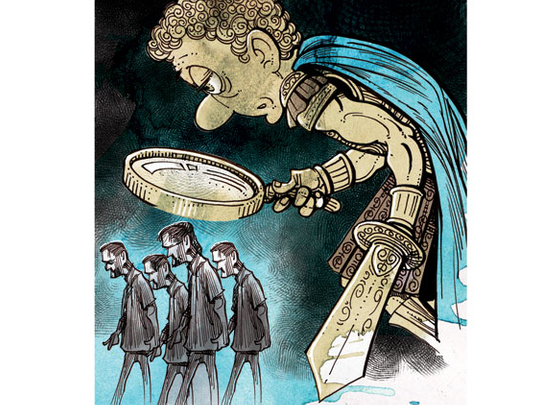
Few months after the collapse of the former Soviet Union, the current Israeli President, Shimon Perez, said: “Islam is the new enemy of the West because it has the same totalitarian nature of Communism.”
Few in the Arab and Muslim world picked it up or thought deeply about it. But from the dust of the recent battle of the offensive film on Prophet Mohammad (PBUH), those words reappear large on the horizon.
Those words turned to be the governing fact that influenced events from 2001 to 2011. The September 11, 2001, attacks were a gift and Perez was ecstatic to monitor the escalating war against the “new enemy of the West”. The war on terrorism was launched soon after the attacks by Al Qaida. But that war against a small group of Muslim militants turned into a war against Islam itself.
In their search for the reasons for anger and radicalism among Muslim youth, historians, academics, researchers and writers in the West went ahead armed with stereotype theories to blame Islam itself. Such theories were reflected (with great stupidity) in pressure from the George W. Bush’s administration on Arab governments to change the education curriculums and erase all verses mentioning “jihad” for instance.
In short, Islam was under the microscope, but the goals were strategic ones: The West can’t live with the Muslim world. A goal which reminds everybody that Samuel Huntington and his theory of a clash of civilisations is right.
History shows that empires and superpowers need an enemy at all times. Enmities are the glue that hold the empire together and justify the imperial wars against others to keep countries and resources under domination. Remember that in this hostile anti-Islam environment, the US launched two wars shortly after September 11 — in Afghanistan and Iraq, in 2001 and 2003, respectively.
By the end of 2004, the Bush administration made some compromises for the sake of interests only and swallowed its demands for reforms and democracy in the Arab world. In the near future, a new debate will start among the American think tanks and politicians, aiming to tackle this question: “Can the US have normal relations or ties with any Arab government dominated by Islamists?” The question was mainly hovering around the Muslim Brotherhood movement, which appears as the only opposition in front of some if not all regimes in the Middle East. Two events made that question vital — the Palestinian elections, which brought Hamas to power, and the Egyptian parliamentary elections in 2005, which gave the Muslim brotherhood 88 seats.
Experts such as John Esposito and Graham Fuller, both with long experience of Muslim world and extremism, were the first to say that US can deal with Arab governments dominated by Islamists and advised that this will be in American interests. But the Bush administration adopted the Israeli stand against the will of Palestinian voters who had ensured Hamas’s win in the most transparent elections in the Arab world in 2005.
However, it seems, Barack Obama’s administration adopted the advice of Esposito and Fuller. Launching a new policy towards the Arab and Muslim world, based on understanding and the respect for Islam’s values, Obama astonished his audience through his inspiring speech at Cairo university in 2009. The proof came in 2011 as the Obama administration fully supported the transformation process in Tunisia and Egypt after the uprisings, with new governments dominated by the Muslim Brotherhood.
There is a long list of those who are not happy to see good or warm relations between the US and the new Islamist governments in the Arab world, but among them all, it is the Israelis who are the most unhappy.
That film insulting Prophet Mohammad (PBUH) does not deserve a second of attention and the $5 million (Dh18.36 million) that was allegedly raised was obviously to provoke a reaction from Arabs and Muslims by offending our great Prophet [PBUH]. A reaction that proves once again that the West cannot live with the Islamic world. Unfortunately, it was a set-up and the majority fell for it.
Attacking embassies, killing diplomats and burning American schools, tearing copies of the Bible are exactly the reactions that the filmmakers wanted. Such acts and reactions revive all those hostile theories against Islam and Arabs which emanated after the September 11 attacks.
Such a goal was always on the Israeli agenda for decades and for sure they are now the happiest ones as Arabs and Muslims have unconsciously proved what Shimon Perez said 21 years ago.
Mohammad Fadhel is a Bahraini writer and media consultant based in Dubai.









